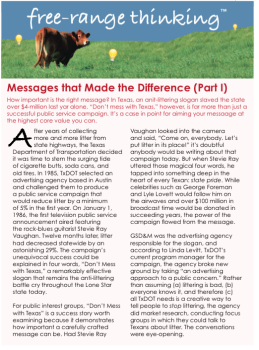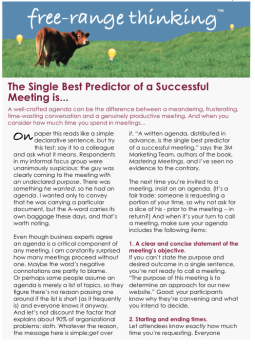Give the People What They Want: A Story
December 2000
Even if you have reams of evidence on your side, remember: numbers numb, jargon jars, and nobody ever marched on Washington because of a pie chart. If you want to connect with your audience, tell them a story.
Read newsletterIf You Don’t Read this Issue Something Terrible Will Happen. And It’s All Your Fault.
November 2000
Welcome to the world of public interest advertising, where too many messages work like this issue’s headline, relying on fear and shame to make the audience react.
Read newsletter10 Principles for Effective Advocacy Campaigns
October 2000
In 1985, Herb Chao Gunther created a code of conduct for progressive activists. Fifteen years later, the guiding force behind Public Media Center revisits his original “Ten Principles,” and he still likes what he sees.
Read newsletterA Media Manual for Grassroots Activists
September 2000
Robert Bray’s new book, SPIN WORKS!, teaches public interest groups how to beat high-powered, well-funded opponents at their own game.
Read newsletterAn Exhortation for a Cessation to Obfuscatory Peroration
August 2000
Fed up reading reports, memoranda, and other documents whose meaning lies buried under a pile of jargon, acronyms, and buzzwords? Three people at the Edna McConnell Clark Foundation reached their breaking point earlier this year and decided to speak out. Plainly, of course.
Read newsletterStreet Theater: The Art of Capturing Hearts and Minds
July 2000
How do you interest people in an issue as complex as genetically engineered food? If you’re John Beske and Jim Slama, you begin by writing a play starring a nine-foot tall vegetable.
Read newsletterYour Summer Reading List
June 2000
Heading towards the beach, mountains, or some other quiet getaway spot this summer? Here are a few good books to stimulate your thinking (preferably the free-range variety) and help you gear up for the next good fight.
Read newsletterPolls: Finding the Right Words in the Numbers
May 2000
Facing an attempted repeal of a controversial “death with dignity” law, Oregon Right to Die polled voters on a range of issues. The results confirmed the group’s hunch: their primary message should not be about death with dignity.
Read newsletterWhy Abstractions Are Obstructions
April 2000
To make sure your audience will read your press releases and reports, be moved by your advertising, and respond to your invitations, keep your language specific, personal, and rooted in everyday concerns.
Read newsletterTaking the Measure of Measure C
March 2000
Measure C would have raised money to widen highways in traffic-choked Sonoma County, but some area environmentalists saw serious flaws in the proposed tax hike. How did the enviros convince frustrated commuters to reject an initially popular measure? Step #1: they stopped talking about the environment.
Read newsletter
“Don’t Mess with Texas”
February 2000
How important is the right message? In Texas, an anti-littering slogan saved the state over $4-million last year alone. Don’t Mess with Texas, however, is far more than just a successful public service campaign. It’s a case in point for aiming your message at the highest core value you can. (PDF format)
Read newsletter
The Single Best Predictor of a Successful Meeting is….
January 2000
A well-crafted agenda can be the difference between a meandering, frustrating, time-wasting conversation and a genuinely productive meeting. And when you consider how much time you spend in meetings.
“He came to the meeting with an agenda.” (PDF format)
Read newsletter